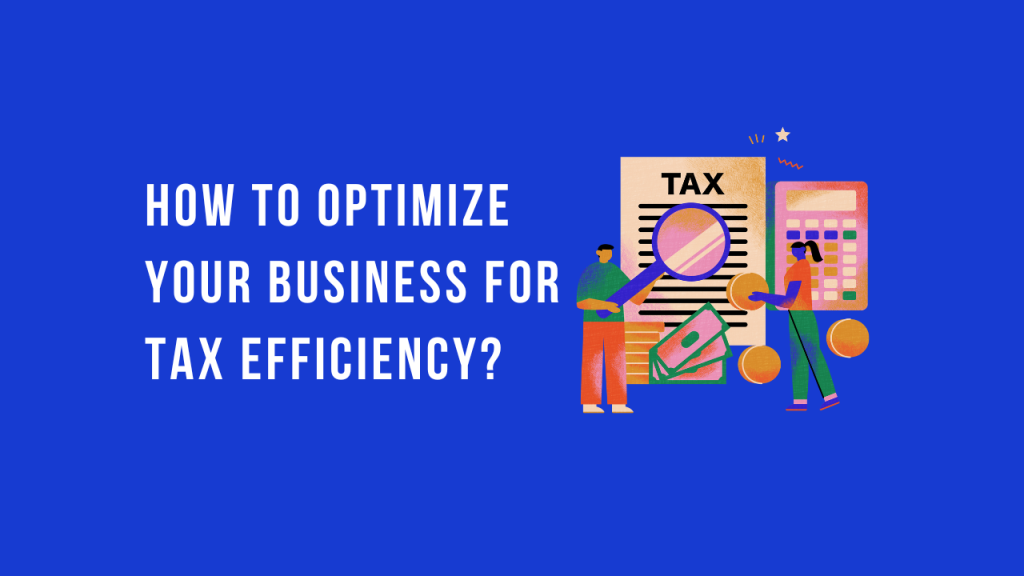Optimize Your Business for Tax Efficiency
In the fast-paced world of business, optimizing your operations for tax efficiency is crucial for sustaining profitability and fostering growth. This article outlines strategies to help businesses in India streamline their tax obligations and enhance financial health.

1. Leverage Tax Incentives for Startups
The Indian government offers several tax incentives to encourage the growth of startups:
- Startup India Initiative: Recognized startups can avail of tax exemptions on profits for three consecutive years within the first ten years of incorporation.
- Angel Tax Exemption: Investments made by Indian resident investors in startups are exempt from the Angel Tax, provided certain conditions are met.
2. Utilize Depreciation Benefits
Maximizing depreciation benefits can significantly reduce taxable income:
- Accelerated Depreciation: Certain assets, like machinery and renewable energy equipment, qualify for accelerated depreciation rates under the Income Tax Act.
- Section 32 Deduction: Ensure you claim the appropriate depreciation rates for your business assets to lower your taxable income effectively.
3. Implement Tax-Efficient Payroll Practices
Optimize payroll processes to ensure compliance and maximize tax efficiency:
- Salary Restructuring: Break down salaries into basic pay, allowances, and benefits such as HRA, LTA, and medical reimbursements to minimize tax liabilities.
- Employee Benefits: Provide tax-exempt benefits like meal vouchers, health insurance, and professional development reimbursements.
4. Claim Input Tax Credit (ITC) Under GST
The Goods and Services Tax (GST) system allows businesses to claim input tax credits for taxes paid on purchases:
- GST Compliance: Ensure timely filing of GST returns to claim ITC without penalties.
- Reconcile ITC: Regularly reconcile your ITC claims with the GST portal to avoid discrepancies and optimize your tax credits.
5. Engage in Effective Transfer Pricing
For businesses with international transactions, transfer pricing compliance is essential:
- Arm’s Length Pricing: Ensure that international transactions with related parties are conducted at arm’s length prices to comply with transfer pricing regulations.
- Documentation: Maintain thorough documentation of transfer pricing policies, methods, and financial data to support your compliance efforts.
6. Invest in Technology for Tax Management
Leveraging technology can streamline tax processes and improve accuracy:
- Tax Software: Implement tax software that integrates with your accounting systems to automate tax calculations and filings.
- Data Analytics: Use data analytics tools to gain insights into your tax liabilities and identify opportunities for tax savings.
7. Explore Tax-Efficient Financing Options
Choosing the right financing options can optimize your tax liabilities:
- Interest Deductions: Loans and other financing arrangements often come with interest payments that are deductible from taxable income.
- Equity Financing: Evaluate the tax implications of equity financing versus debt financing to find the most tax-efficient capital structure.
8. Participate in Government Schemes and Subsidies
Various government schemes and subsidies can enhance tax efficiency:
- MSME Schemes: Small and medium enterprises can benefit from tax reliefs and subsidies under various MSME initiatives.
- Export Incentives: Businesses engaged in export activities can avail of tax benefits under the Merchandise Exports from India Scheme (MEIS) and other export promotion schemes.
9. Hire Specialized Tax Consultants
Complex tax environments necessitate expert guidance:
- Tax Consultants: Engage specialized tax consultants to develop tailored tax strategies and ensure compliance.
- Continuous Advisory: Maintain an ongoing relationship with tax advisors to adapt to changing tax laws and optimize your tax position continuously.
Conclusion
Optimizing your business for tax efficiency requires a strategic approach that integrates various tax-saving measures and compliance practices. By leveraging tax incentives, utilizing depreciation benefits, implementing tax-efficient payroll practices, and engaging in effective transfer pricing, businesses can significantly enhance their financial health.
For expert guidance in navigating the complexities of tax optimization, consider partnering with Finout. Our extensive experience in financial services, accounting, and business growth solutions ensures your business operates efficiently, lawfully, and profitably. Let Finout help you achieve your financial goals and secure a prosperous future for your business.

